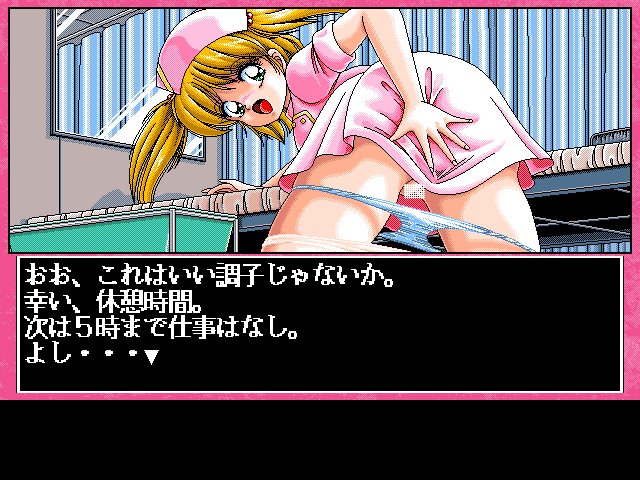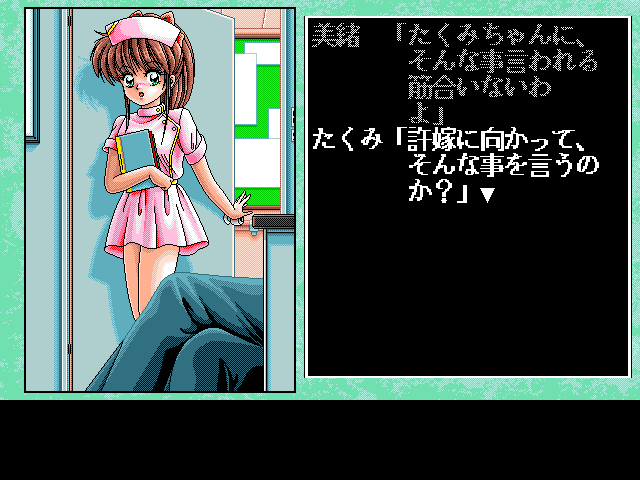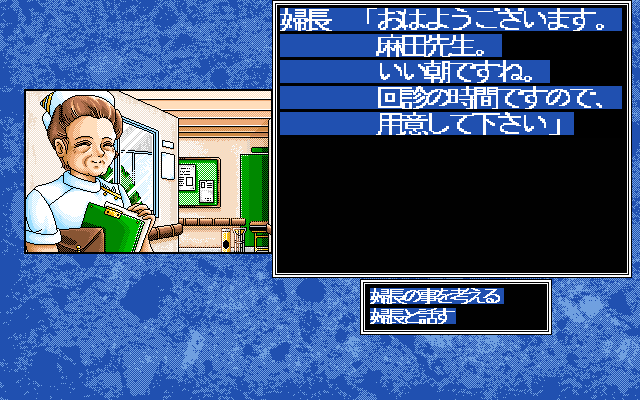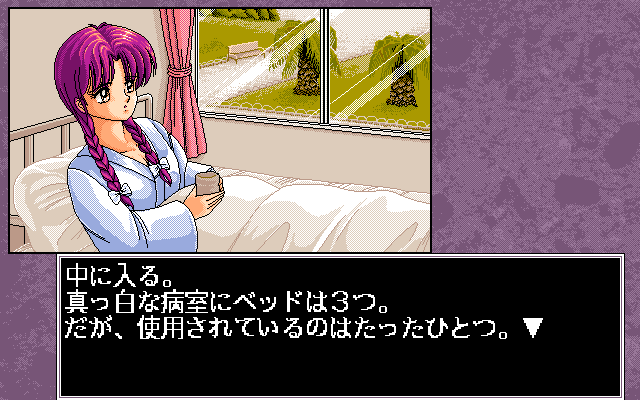Retro Replay Review
Gameplay
Dr. Stop! offers a classic first-person Japanese adventure experience, driven by menu-based commands and text descriptions. From the moment you step into the hospital’s corridors, you’ll find yourself selecting actions like “Investigate,” “Talk,” or “Move” to navigate Takumi’s day-to-day life and the unfolding mystery. This straightforward interaction model keeps the focus on narrative choices and investigation rather than twitch reflexes or complex mechanical systems.
The pacing of gameplay hinges on your choices: you can decide which patients to visit, which clues to pursue and when to question hospital staff. Each command decision can unlock new dialogue branches, reveal hidden events, or trigger romance-building opportunities. The non-linear structure means repeat playthroughs can lead to different revelations and patient interactions, adding replay value for completionists or mystery aficionados.
Investigation sequences often require you to connect disparate pieces of information—from overheard conversations to environmental cues in background art. This encourages careful reading and attention to detail, rewarding players who explore every menu option. While some rooms present only text descriptions, these moments are crucial for uncovering motives, suspect alibis and the underlying reason behind the explosion.
Romantic subplots are woven seamlessly into the investigative framework. As Takumi, you can choose to pursue the affections of various young and pretty patients, influencing both the story outcome and your access to new leads. Balancing investigative rigor with relationship-building makes Dr. Stop! feel like part visual novel, part detective thriller.
Graphics
Graphically, Dr. Stop! adopts a traditional anime-style aesthetic, with colorful backgrounds in key hospital rooms. These hand-drawn scenes help establish atmosphere—whether it’s the hushed tension of the operating theater or the serene calm of the recovery ward. Character portraits appear during dialogue, adding emotional nuance to Takumi’s conversations with patients and staff.
However, not every location receives illustrated treatment. Several areas rely on text-only descriptions, which can feel sparse compared to the fully rendered scenes. While this minimalist approach conserves development resources, it occasionally interrupts immersion when you expect visual context. That said, strong writing often compensates for the lack of imagery, painting vivid mental pictures of corridors, secret storage rooms and patient rooms.
The user interface is clean and functional, featuring a hospital map for navigation and clear command menus. Icons and text are legible, with color-coding that helps differentiate investigative actions from social ones. Transitions between rooms are swift, ensuring your focus stays on exploration rather than waiting for load times.
Although Dr. Stop! doesn’t push graphical boundaries, its art style is consistent and charming. Fans of classic anime visuals will appreciate the character designs and environment art. For those seeking photorealism or high-definition animation, the game’s retro sensibility may feel intentionally nostalgic rather than cutting-edge.
Story
The narrative thrust of Dr. Stop! revolves around an unexpected explosion in the hospital, leaving Takumi to determine whether the culprit is a patient, outsider or staff member. This central mystery drives the game’s tension, as every conversation and clue could point you toward the perpetrator—or lead you down a false trail. The stakes feel personal, especially as rumors swirl and patient trust becomes a scarce commodity.
Parallel to the mystery, the game explores Takumi’s often fumbling attempts at romance. Each interaction with a “young and pretty” patient is tinged with both humor and genuine emotion, creating a contrast between the high-stress investigation and lighthearted dating beats. The dual focus keeps the story dynamic, preventing it from becoming too dour even as you piece together explosive evidence.
Dialogue is the backbone of Dr. Stop!’s plot progression. Well-written text sequences shine when uncovering hidden motives, revealing secret relationships or staging unexpected plot twists. Conversely, a few overlong exposition dumps may slow the narrative flow for players who prefer more action-oriented storytelling. Still, if you’ve ever enjoyed a mystery visual novel, you’ll find the pacing familiar and rewarding.
Multiple endings hinge on both your investigative thoroughness and your romantic choices. Whether you unmask the saboteur or fail to convince key witnesses, your relationship with the patients can open or close narrative paths. This branching design encourages careful note-taking and deliberate decision-making throughout your playthrough.
Overall Experience
Dr. Stop! succeeds in blending investigation and romance within a hospital setting, offering an engaging if somewhat retro adventure. Its strength lies in the interplay between mystery-solving and character interaction, creating moments of genuine suspense and occasional lighthearted relief. Fans of text-based storytelling will find themselves drawn into Takumi’s world from the first menu command.
The game’s slower pace and reliance on text do require patience. Players used to visual spectacle or rapid-fire action may find the methodical progression a bit dated. Yet those who appreciate nuance, reading carefully and exploring every dialogue branch will be rewarded with satisfying plot revelations and meaningful relationship arcs.
Replay value is significant. With multiple suspects, romance options and potential endings, each playthrough can reveal new facets of the story. This encourages players to experiment with different dialogue choices, revisit suspects and pursue alternative romantic paths. Over time, you’ll piece together the complete narrative tapestry of the hospital mystery.
Ultimately, Dr. Stop! offers a unique blend of anime-style visuals, classic point-and-click investigation and heartfelt romantic storytelling. While it may not appeal to every gamer, those seeking a thoughtful, narrative-driven experience in a medical thriller setting will find it a memorable and engaging title.
 Retro Replay Retro Replay gaming reviews, news, emulation, geek stuff and more!
Retro Replay Retro Replay gaming reviews, news, emulation, geek stuff and more!








Reviews
There are no reviews yet.